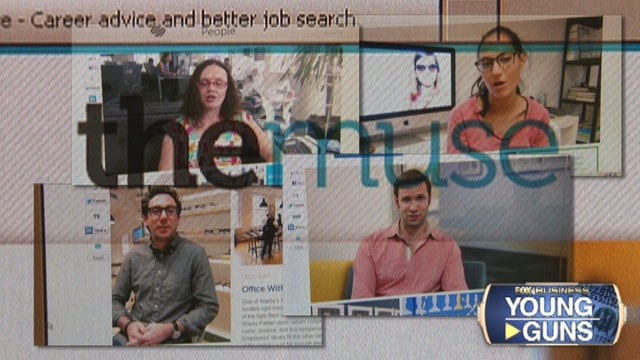Job Search 2.0
Searching for a job online involves scrolling through a lot of black and white text -- the summary of said job, expected qualifications, etc.
The process itself is pretty lackluster. But entrepreneurs Alex Cavoulacos and Kathryn Minshew also think it's out of touch with the high-tech world of today.
"For me, I spent months on job boards in 2010 and was frustrated by the experience. It's antiquated and clunky, and there was nothing about a particular job posting that helped me favor one company over another," said Minshew. "You literally get a list of 5,000 jobs that look the same. It's honestly one of the worst user experiences on the web, and we believed we could build something better."
“I’d say what we are doing is really taking companies and cutting out a little hole in their walls and letting people see what it’s like inside,”
Building something better is exactly what they believe they've done. Their startup, The Muse, allows potential employers to interact with users through video interviews, giving job hunters a better sense of what it’s like to work at different companies. This web-based job community also offers career advice – helping people answer the age-old question: “What should I do with my life?”
“It’s definitely a huge feat and one of the things we realized is that people have a set number of options in their brain from when the time they are a small child,” said Cavoulacos. “You can be a doctor or a lawyer or maybe a fireman – and as you grow older that option set gets wider and wider but you still don’t know the full picture….We are really passionate about helping people widen their horizons.”
So far the company has 100 hiring partners, including AOL, Facebook, NPR and TED, that pay to be on the site. The founders have raised $1.2 million in revenue and say their company will be profitable within the year.
“I’d say what we are doing is really taking companies and cutting out a little hole in their walls and letting people see what it’s like inside,” said Cavoulacos. “If you go to a top retailer, you see how they show all their top products off. It’s beautiful.… But then you go to their career page. It’s black and white, it’s all text -- and they really should be using the same tools to market their companies and their positions as they are to market their products.”
Follow Christina on Twitter @ChristinaScotti
What is your favorite quote and why?
AC: I've always loved the quote from Walt Disney: "It's kind of fun to do the impossible" - I have it at my desk to remind me that there are no limits to what we can envision, create and build.
KM: I really liked the quote from Y Combinator: "Make something people love." I think that's at the heart of what allows you to push through obstacles in the early days. Having 148 investors say no in your first three months is less depressing if you know without a doubt that your users adore you, and think you have markedly changed their life for the better.
How do you differentiate yourself from the competition?
KM: Job seekers light up when they find The Muse - we're a breath of fresh air in a stale, musty world. Our user experience focuses first and foremost on the individual, on providing them information - from content to company profiles - to make the most pressing professional decisions in their lives. We allow discovery rather than simply search -- and before you scoff, think about how many e-commerce sites have switched from a "point-click-buy" model to one built on browsing and serendipitous exploration. There's a deep human yearning to explore, and we're the only company providing that in the career space.
What are the pros and cons of having a co-founder?
KM: Having a co-founder is incredible, but it has to be the right person. Someone who shares your values and ethics, absolutely, but also someone who has a similar vision for the future in terms of their appetite for risk, for low salaries, for hard work.
AC: When we started The Muse, Kathryn and I sat down with our third co-founder Melissa and divided up the world in terms of what we each owned. We made a lot of the hard decisions upfront - who has what equity, what role, what control -- so that things would be easier down the line.
There is no denying this is a useful service but how do you plan to generate money?
We make a lot of money right now, via companies who pay to share their jobs with our community. A lot of the top companies can't find the talent they need on other sites -- so they come to us.
Where do you see yourself in five years?
AC: In five years, I imagine I'll be growing The Muse to many hundreds or even thousands of employees, and scheming up how to keep scaling and entering new markets on our quest towards total world domination. Jokes aside, I likely will still be leading the product vision, but be spending a lot of time thinking about how we hire the best for ourselves, grow and invest in our team and keep our incredible culture strong.
Where do you see The Muse in five years?
We believe we're finally in an era where it's realistic for people to find work that inspires them, if only given the tools and information to do so, and we want The Muse to be at the forefront of this new era. I want us to be used by hundreds of millions of people around the globe, not because they need a job but because they're thinking about a career.




















